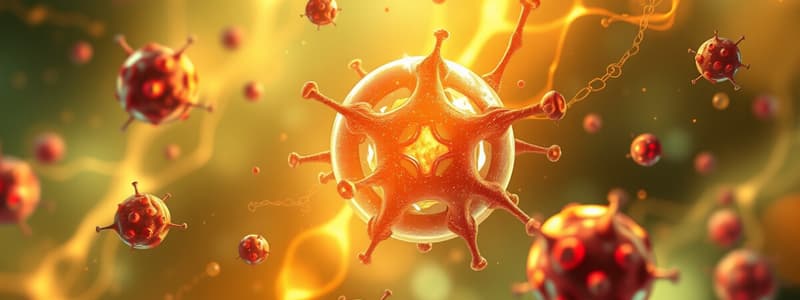Podcast
Questions and Answers
Which drug will the nurse administer to a patient in need of an immediate drug response?
Which drug will the nurse administer to a patient in need of an immediate drug response?
- A high first-pass drug
- A placebo
- An oral drug
- A loading dose (correct)
Which side effect will the nurse include when teaching a patient about diphenhydramine prescribed for the treatment of allergies?
Which side effect will the nurse include when teaching a patient about diphenhydramine prescribed for the treatment of allergies?
- Bladder contraction
- Decrease in blood pressure
- Mild sedation (correct)
- Increase in peristalsis
Which type of effect occurs when a psychological benefit is obtained from a compound that may not have a drug effect?
Which type of effect occurs when a psychological benefit is obtained from a compound that may not have a drug effect?
- Toxic
- Side
- Placebo (correct)
- Adverse
What is bioavailability?
What is bioavailability?
Which type of effect occurs when a psychological benefit is obtained from a compound that may not have a drug effect?
Which type of effect occurs when a psychological benefit is obtained from a compound that may not have a drug effect?
Which term is used to describe the biotransformation of a drug?
Which term is used to describe the biotransformation of a drug?
Which effect will the nurse suspect when a patient receiving pain medication for more than 24 hours states, 'This medication is not helping my pain like it did yesterday'?
Which effect will the nurse suspect when a patient receiving pain medication for more than 24 hours states, 'This medication is not helping my pain like it did yesterday'?
Which instruction would the nurse include when teaching a patient about the administration of phenelzine?
Which instruction would the nurse include when teaching a patient about the administration of phenelzine?
Which action occurs when a drug reaches its half-life?
Which action occurs when a drug reaches its half-life?
Which intervention will the nurse implement when caring for a patient who is receiving a drug with a narrow therapeutic index?
Which intervention will the nurse implement when caring for a patient who is receiving a drug with a narrow therapeutic index?
Which information will the nurse consider when caring for a patient who has been prescribed digoxin once daily?
Which information will the nurse consider when caring for a patient who has been prescribed digoxin once daily?
Which action by the nurse when reviewing a new medication prescription is consistent with pharmacogenetic principles?
Which action by the nurse when reviewing a new medication prescription is consistent with pharmacogenetic principles?
Which term is used to describe the study of drug effects on the body?
Which term is used to describe the study of drug effects on the body?
Which term is used to describe the ratio between a drug’s therapeutic effects and its toxic effects?
Which term is used to describe the ratio between a drug’s therapeutic effects and its toxic effects?
Which route of drug administration provides the fastest therapeutic effect?
Which route of drug administration provides the fastest therapeutic effect?
Which time frame would a nurse select for a blood sample to be drawn from a patient to obtain a trough level?
Which time frame would a nurse select for a blood sample to be drawn from a patient to obtain a trough level?
Which laboratory test would indicate the highest plasma concentration of a drug at a specific time?
Which laboratory test would indicate the highest plasma concentration of a drug at a specific time?
Which factor will the nurse consider when administering a drug with a narrow therapeutic index (TI)?
Which factor will the nurse consider when administering a drug with a narrow therapeutic index (TI)?
Which drug delays the renal excretion of penicillin?
Which drug delays the renal excretion of penicillin?
Which instruction would the nurse include when teaching a patient about the administration of sulfonamide?
Which instruction would the nurse include when teaching a patient about the administration of sulfonamide?
Which statement describes a characteristic of highly protein-bound drugs?
Which statement describes a characteristic of highly protein-bound drugs?
Which pharmacokinetic phase is affected by a compromised renal system?
Which pharmacokinetic phase is affected by a compromised renal system?
Which effect on the bioavailability of a drug occurs when a patient takes an enteric-coated medication with a large amount of food?
Which effect on the bioavailability of a drug occurs when a patient takes an enteric-coated medication with a large amount of food?
Flashcards
Pharmacodynamics
Pharmacodynamics
Studies the effects of drugs on the body, including their influence on cellular physiology.
Pharmacokinetics
Pharmacokinetics
Analyzes how the body affects a drug through absorption, distribution, metabolism, and excretion.
Placebo effect
Placebo effect
A psychological benefit derived from an inert compound that typically lacks pharmacological activity.
Side effects
Side effects
Signup and view all the flashcards
Drug metabolism
Drug metabolism
Signup and view all the flashcards
Tolerance
Tolerance
Signup and view all the flashcards
Tachyphylaxis
Tachyphylaxis
Signup and view all the flashcards
Half-life
Half-life
Signup and view all the flashcards
Narrow Therapeutic Index Drugs
Narrow Therapeutic Index Drugs
Signup and view all the flashcards
Therapeutic index
Therapeutic index
Signup and view all the flashcards
Intravenous (IV) administration
Intravenous (IV) administration
Signup and view all the flashcards
Trough levels
Trough levels
Signup and view all the flashcards
Peak levels
Peak levels
Signup and view all the flashcards
Drug excretion
Drug excretion
Signup and view all the flashcards
Loading dose
Loading dose
Signup and view all the flashcards
Placebo Effect
Placebo Effect
Signup and view all the flashcards
Side Effects
Side Effects
Signup and view all the flashcards
Drug Toxicity
Drug Toxicity
Signup and view all the flashcards
Adverse Reactions
Adverse Reactions
Signup and view all the flashcards
Study Notes
Pharmacokinetics vs. Pharmacodynamics
- Pharmacodynamics studies the effects of drugs on the body, including their influence on cellular physiology.
- Pharmacokinetics analyzes how the body affects a drug through absorption, distribution, metabolism (biotransformation), and excretion.
Placebo Effect
- The placebo effect is a psychological benefit derived from an inert compound that typically lacks pharmacological activity.
- Side effects are physiological responses not related to the desired outcome of a drug.
Drug Metabolism
- Metabolism involves the biotransformation of drugs, which can convert inactive substances into active forms, often occurring in the liver.
- Only through metabolism can drugs be broken down or transformed for elimination.
Tolerance and Tachyphylaxis
- Tolerance refers to a gradual decrease in response to a drug after prolonged use.
- Tachyphylaxis is a rapid decrease in response, often described as "acute tolerance."
Phenelzine Administration
- Patients on phenelzine, a monoamine oxidase inhibitor (MAOI), must avoid tyramine-rich foods (e.g., sour cream) due to risks of hypertensive crisis.
- Instructions include taking the medication as prescribed, as certain foods can interact negatively.
Half-Life of Drugs
- The half-life indicates the time taken for half of a drug dose to be eliminated from the body, critical for understanding drug dosing and timing.
- The therapeutic effect of a drug is not directly related to its half-life.
Monitoring Narrow Therapeutic Index Drugs
- Drugs with a narrow therapeutic index (TI) require careful monitoring of plasma drug levels to prevent toxicity.
- TIs account for the small range between therapeutic and toxic doses.
Digoxin Considerations
- Monitor for potential toxicity in patients receiving digoxin due to its long half-life; a steady state concentration occurs after about 5-7 days.
Pharmacogenetics in Drug Administration
- The Precision Medicine Initiative emphasizes using genetic testing and patient-specific factors to select appropriate medications.
- Selecting the right medication can minimize adverse reactions and enhance efficacy.
Therapeutic Index
- The therapeutic index measures the margin of safety of a drug, comparing its effective dose to toxic effects, highlighting its safety profile.
Routes of Drug Administration
- Intravenous (IV) administration provides the fastest therapeutic effect due to immediate bioavailability, essential for urgent medical situations.
Peak and Trough Drug Levels
- Trough levels indicate the lowest plasma concentration of a drug just before the next dose, essential for managing dosing regimens.
- Peak levels measure the highest concentration of a drug, typically assessed after a specific time post-administration.
Drug Excretion
- The kidneys are primarily responsible for drug excretion, with compromised renal function potentially leading to drug accumulation and toxicity.
Enteric-Coated Medications
- Enteric-coated drugs should not be taken with large quantities of food, which can dissolve the coating and reduce bioavailability.
Immediate Drug Response
- Administering a loading dose provides an immediate drug response rapidly achieving the desired therapeutic effect.
Side Effects of Diphenhydramine
- One notable side effect of diphenhydramine, an antihistamine for allergies, is mild sedation, relevant for patient instruction.### Effects of Bethanechol
- Bethanechol decreases blood pressure through its action on cholinergic receptors.
Types of Drug Effects
- Placebo Effect: A psychological benefit gained from a compound, which may lack any actual drug effect.
- Side Effects: Physiological effects not related to desired drug effects.
- Drug Toxicity: Assessable by measuring blood levels of the drug.
- Adverse Reactions: More severe than side effects, indicating greater harm or risk from drug use.
Studying That Suits You
Use AI to generate personalized quizzes and flashcards to suit your learning preferences.



